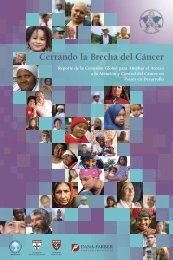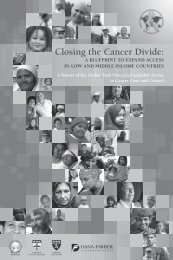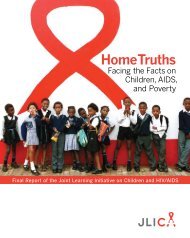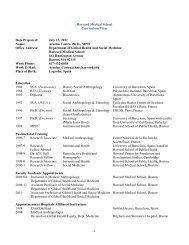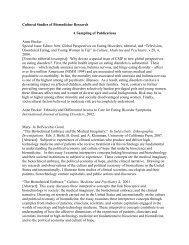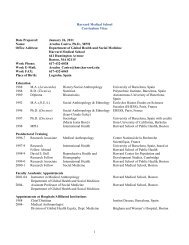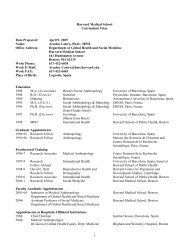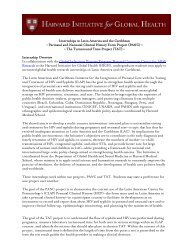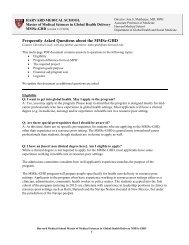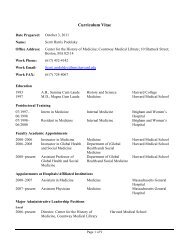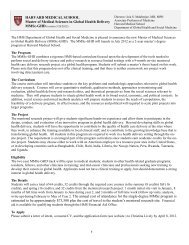Financial model for MMSc programs – - The Department of Global ...
Financial model for MMSc programs – - The Department of Global ...
Financial model for MMSc programs – - The Department of Global ...
You also want an ePaper? Increase the reach of your titles
YUMPU automatically turns print PDFs into web optimized ePapers that Google loves.
HARVARD MEDICAL SCHOOL<br />
Master <strong>of</strong> Medical Sciences in <strong>Global</strong> Health Delivery<br />
<strong>MMSc</strong>-GHD (version 12.3/2012)<br />
<strong>The</strong> HMS <strong>Department</strong> <strong>of</strong> <strong>Global</strong> Health and Social Medicine is pleased to announce the new Master <strong>of</strong> Medical Sciences<br />
in <strong>Global</strong> Health Delivery (<strong>MMSc</strong>-GHD). <strong>The</strong> <strong>MMSc</strong>-GHD will launch in July 2012 as a 2-year master’s degree<br />
program at Harvard Medical School. In<strong>for</strong>mation can be found here:<br />
http://ghsm.hms.harvard.edu/education/degree_<strong>programs</strong>/<br />
<strong>The</strong> Program<br />
<strong>The</strong> <strong>MMSc</strong>-GHD combines a rigorous HMS-based curriculum focused upon the development <strong>of</strong> the tools needed to<br />
per<strong>for</strong>m social and delivery science and policy research in resource limited settings with a 9-month on-site mentored<br />
health care delivery research project at a global health program. Students will submit a master’s thesis based on this work.<br />
Please note that this program does not <strong>of</strong>fer clinical training, and that there is neither coursework nor project work<br />
involving direct patient care.<br />
<strong>The</strong> Curriculum<br />
<strong>The</strong> course curriculum will introduce students to the key problems and methodologic approaches relevant to global health<br />
delivery research. Courses will cover quantitative methods, qualitative methods, approaches to monitoring and<br />
evaluation, global health delivery and research ethics, and theoretical perspectives from the social sciences relevant to<br />
medicine. <strong>The</strong>y will prepare students to situate global health work in its broad social, economic, and political contexts. In<br />
addition, social science and mixed methods analytics will prepare students to assess the needs <strong>of</strong> a population, the<br />
feasibility <strong>of</strong> a delivery program, its effectiveness, and the resources and political will required to scale pilot projects into<br />
larger <strong>programs</strong>.<br />
<strong>The</strong> Project<br />
<strong>The</strong> mentored research project will give students significant hands-on experience and allow them to participate in the<br />
design, conduct, and evaluation <strong>of</strong> an innovative program in global health delivery. Beyond developing skills in global<br />
health delivery, students will have the opportunity to contribute to the quality <strong>of</strong> health care delivery at the sites where<br />
they work, to enhance the training available to local clinical staff, and to contribute to the growing knowledge base that is<br />
trans<strong>for</strong>ming global health. All students in this program are required to per<strong>for</strong>m non-clinical work in a health delivery<br />
setting through the on-site project. <strong>The</strong> requirement is an integral part <strong>of</strong> the program curriculum since students earn<br />
academic credits <strong>for</strong> the on-site project. Program staff will assist students developing suitable projects. Students may<br />
choose to conduct their research either in a resource poor area in the United States or in developing countries such as (but<br />
not limited to) Bangladesh, Chile, Haiti, India, Liberia, the Navajo Nation, Peru, Rwanda, Tanzania, and Uganda.<br />
Students may work with an American employer or with a non-American organization in the U.S. or abroad.<br />
Eligibility<br />
<strong>The</strong> two year <strong>MMSc</strong>-GHD track will be open to medical students; students in other health-related graduate <strong>programs</strong>;<br />
residents, fellows, and other clinicians in training; and mid-career clinicians and pr<strong>of</strong>essionals seeking new training to<br />
develop their careers in global health. Applicants need not have clinical training to apply, but should demonstrate a strong<br />
interest in global health delivery.<br />
<strong>The</strong> Details<br />
Students will earn a total <strong>of</strong> 64 credits, 32 credits through the required core courses in the summer (8 credits) fall (16<br />
credits), and spring (16 credits), and 32 credits from the mentored research project: 1 month initial site visit in January, 8<br />
months <strong>of</strong> full time work from June to January during year 2, and 3 months <strong>of</strong> full time work (follow up visits, analysis,<br />
write-up) during February to May <strong>of</strong> Year 2. <strong>The</strong> annual cost <strong>of</strong> attendance <strong>for</strong> the single-degree <strong>MMSc</strong> program is<br />
estimated to be approximately $32,000 per year <strong>for</strong> tuition plus living expenses and the cost <strong>of</strong> travel to the<br />
student’s mentored research site. <strong>Financial</strong> aid may be available <strong>for</strong> qualifying students.<br />
1<br />
Director: Joia S. Mukherjee, MD, MPH<br />
Associate Pr<strong>of</strong>essor <strong>of</strong> Medicine<br />
Harvard Medical School<br />
<strong>Department</strong> <strong>of</strong> <strong>Global</strong> Health and Social Medicine
Why choose to pursue this <strong>MMSc</strong>-GHD?<br />
• Students will gain valuable mentored on site experience working in the field at established global health locations.<br />
• Student mentored projects will have a direct impact on the sites in which they work.<br />
• Students will actively work on innovations to deliver health care in a global setting.<br />
Questions? For more in<strong>for</strong>mation, please contact Christina Lively: mmscghd@hms.harvard.edu.<br />
Program Schedule<br />
Core Courses<br />
Term<br />
Summer<br />
School/course ID Faculty<br />
Studies in <strong>Global</strong> Health Delivery HSPH GHP 532 Joseph Rhatigan<br />
Epidemiologic Methods <strong>for</strong> <strong>Global</strong> Health HSPH EPI 505 Mary Kay Smith-Fawzi<br />
Value-Based Management in <strong>Global</strong> Health Delivery HMS Rebecca Weintraub<br />
Quantitative Methods <strong>for</strong> <strong>Global</strong> Health (new)<br />
Fall<br />
HSPH BIO 507 Bethany Hedt and Marcello Pagano<br />
Qualitative Methods <strong>for</strong> <strong>Global</strong> Health (new)<br />
Management in Medicine<br />
HMS<br />
HMS IN 601<br />
Norma Ware<br />
Stan Finkelstein, Richard Bohmer, others<br />
Societies <strong>of</strong> the World (Social Medicine and <strong>Global</strong> Health) FAS SW 25 Paul Farmer, Anne Becker, Arthur Kleinman<br />
Conceptual and Practical Ethical Problems in <strong>Global</strong> HMS Sadath Sayeed<br />
Health Delivery (Population-Based Ethics)<br />
Spring<br />
Mixed Methods in Practice (Design, Implementation<br />
and Evaluation)<br />
HMS TBD<br />
Managing <strong>Global</strong> Health HBS 2230 Nava Ashraf<br />
2



